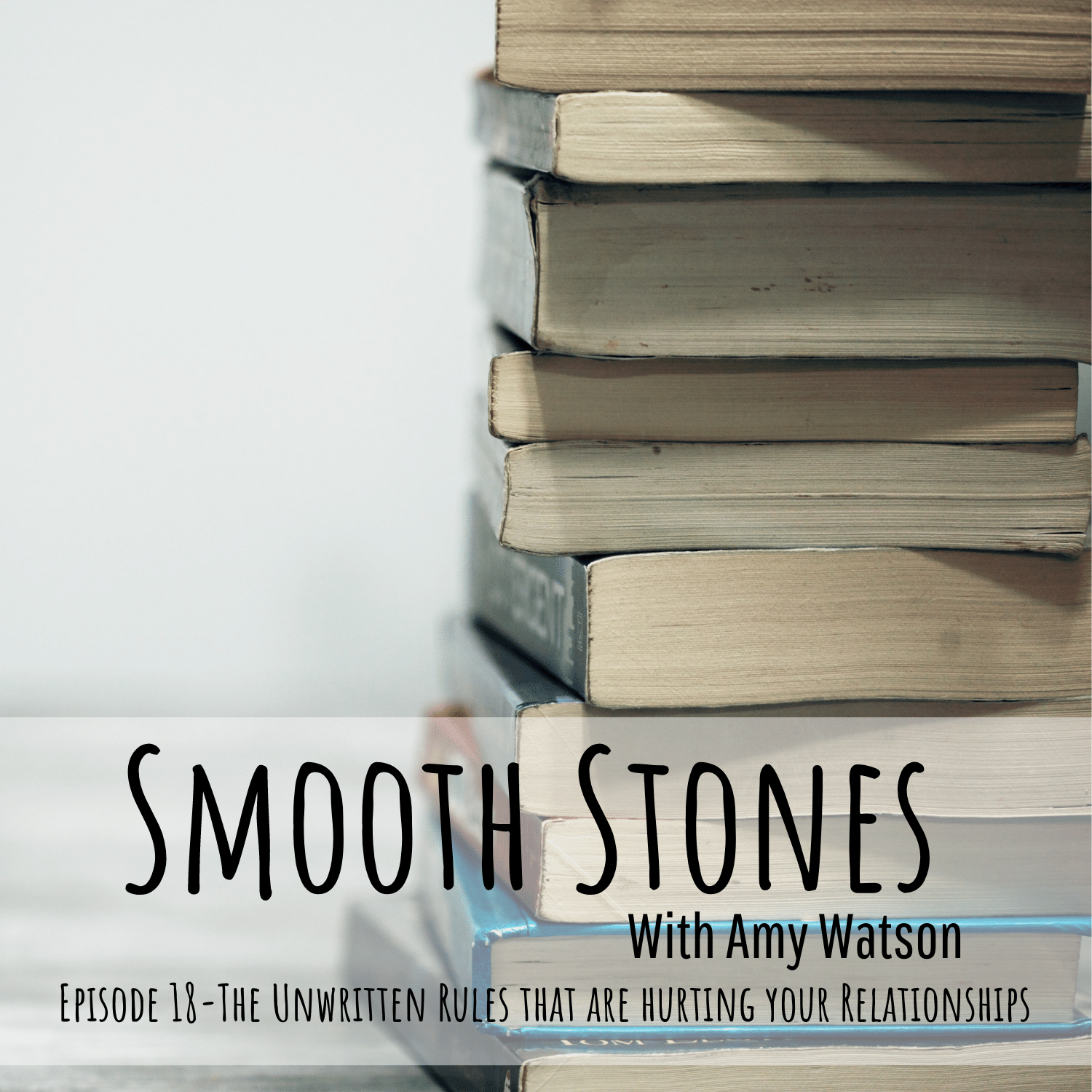Today we are talking about Manuals, the unwritten rules that we have about the people in our lives. We want them to follow these rules so that we can feel how we want to feel.
Unfortunately it doesn’t, work, because…humans are terrible at doing what we think they should!
We’re going to discuss what manuals are, give some examples and answer some common questions.
Recognizing and dropping these manuals is some of the best work you can do for you and your relationships.
For the clip of The Break Up:
https://www.youtube.com/watch?v=JKKyxmf_BR8
If you have any questions, let me know here:
http://smoothstonescoaching.com/work-with-me
If you would like to share your baby’s story on the podcast, submit here: http://smoothstonescoaching.com/podcast-submissions
For a free 30 minute session, click here to schedule:
http://smoothstonescoaching.com/free_mini
Music provided by ZingDog / Pond5
Photo by Sharon McCutcheon on Unsplash
Transcription
I came into my marriage with an idea. And this idea was when we go to bed, we should be able to talk and decompress and go over everything that happened in the day and snuggle and. Just spend this time before we go to sleep. It’s gonna be amazing. If you follow me on Instagram, you know that I got married just before I turned 20.
And because of my beliefs and because I went to Brigham Young University, which has a lot of rules in an honor code where there’s no sleepovers, there’s no nothing before marriage. It was like, when we get married, this is the time, right? We finally don’t have to go home. We get to spend this time together at night.
And so I had all these expectations for this bedtime conversation and connection going into my marriage. Now, my husband, on the other hand, his head hits the pillow and he is asleep. So you can see how these two different. Ways of thinking. It can cause a problem. So there I am, feeling really hurt and making it mean all these things.
And honestly, there were nights where I would cry myself to sleep because I wanted to talk or we needed to work something out and I would save it till bedtime and then he would fall asleep and I would just be there awake, not being able to fall asleep, overthinking. All that fun stuff, and some of you might think this is so silly, like, why would you do that?
Why is it such a big deal? Or you might be totally relating to me because I think in so many relationships, there’s that one person that can just fall asleep and the other person that it’s not so easy. But it took years for me to figure out that him going to sleep didn’t have to mean anything except that he was tired and he preferred to go right to sleep.
But I’m gonna save you guys all the trouble that I had to go through and teach you about manuals today. So manuals are just rules that we have about how people should behave so that we can feel a certain way. And a lot of times they’re unwritten or we don’t even recognize that we have them. We’ve just picked up beliefs directly or indirectly throughout our lives, and they’re there.
They are instructions for others and. They’re an attempt to control our circumstances. So if you’ve been listening for a while, you know that our circumstances are just the facts of our lives. So we’re trying to control our circumstances. So in my case, like I wanted my husband to stay awake and talk.
That’s just a circumstance that’s neutral, and our manuals are really logical and reasonable. They seem fair. They seem kind. They seem like the truth. This is a big one, right? We know the way that everything would go better. Right? And it seems really helpful, like if people would just. Do the things we want them to do or act the way we want them to act.
Their lives would be easier, our lives would be easier, everything would be better. And that’s that ego part of just being a human right. We just are self-centered and we see things through our point of view. Okay? So our brains are just so good at coming up with these manuals, and we all do it. We like rules and manuals are helpful for us when maybe we’re trying to learn about a new car we just bought, or if we’re putting together IKEA furniture or we’re learning new procedures at our job.
Uh, I recently was looking to bake a New York style cheesecake for my daughter’s 13th birthday. You guys, I have three teenagers in the house now. So that’s a little bit crazy, but I wanted someone to tell me how to bake the best cheesecake with the best crust and no cracks and the best flavor, and I just wanted it to be perfection for her birthday.
Now, I’ve made a lot of things and I love to bake, but I never tried like a full on New York style cheesecake. So this might work when we’re talking about a recipe to have rules, but when it comes to the people in our lives, it actually gets us in a lot of trouble. But why? Well, what happens is that we have an idea about how someone should act, but people are terrible at following our rules.
Often it’s because we don’t communicate them, we just think they should know. And because people don’t always agree with our manuals. Darn it, isn’t that just so frustrating? Wouldn’t life just be easier if everyone just agreed to do it our way? I. So this is where traditional relationship advice is often really ineffective.
If there’s friction, the experts or counselors, they will tell you to communicate your needs and give your spouse a list and even tell them how they should love you. How do we show love? Give them this nice list, and then if they follow it, then you can feel love and connection and everything you want to feel.
But this rarely works because you are married to a human being with a brain. So either they don’t follow the list and then you have to feel terrible. Or they follow the list out of obligation, and again, you are left not feeling what you wanted. It’s a bit like the scene in the breakup with Jennifer Aniston, and this gets referenced a lot.
I think even if you haven’t seen the movie, you’ve probably heard about this scene. She’s in the kitchen and he’s sitting on the couch playing video games and she wants him to help and she says, I want you to want to do the dishes, and he says, why would I want to do the dishes? Now? I had to go and rewatch this scene as I was wanting to talk about it a little bit on the episode, and it is a perfect example of how manual’s completely disempower us.
So go take three minutes. And observe this couple as they lay out their expectations and their frustrations. And just try to be an observer. Watch both sides of the argument. So they’re not only fighting about the dishes, but they’re fighting about some lemons he was supposed to pick up and he’s fighting.
He wants time to relax for a minute, and he wants to do the dishes later, and she wants to do them now. And I’ll put a link in the show notes, or you can just Google the breakup kitchen fight scene. And when we watch other people, sometimes it’s so obvious, but it’s really hard to see it when it’s ourselves, right?
So what can we do? We’ve been trying to change behavior all this time, right? We’ve learned that throughout our lives. If we can just get the people in our lives to do what we want them to, then we can feel better. Brooke Castillo said, focusing on others and their actions keeps us stuck. True change comes from within you.
And I know again, it, it just would be so much easier if they would do what we wanted them to, but they’re not going to. And the only way to change how we feel is to change our own thoughts and to work on managing our own brain. The only person you can control is you. One of the best things you can learn is to let everyone else be exactly as they are.
Our spouse, our kids, our in-laws, even the people in the school pickup line. I still have some work to do there, but just remember the way those people choose to drive can’t make me feel anything. The only reason I end up frustrated is because I have a manual for how I think that they should do it. I have lots of ideas of how fast people should drive and how long they should sit there when they’re dropping off their kids or picking them up.
It’s my thoughts that are the problem. And it’s a great idea to pick something like this school pickup example and practice noticing your manuals and then see if you can let go of them, right? Because I am, I’m the one feeling frustrated, but if I just let people do what they’re gonna do and love them anyways, then I get to feel those more positive emotions rather than being just so annoyed.
So take a piece of paper, choose a specific person or a situation, and write down all the ways you think that they should act, and then how would you get to feel if they acted that way? And then get curious about what it would be like if you just didn’t have all these rules anymore. It’s such good work to do you guys.
The truth is when we blame people for how we feel, it strains the relationship we are trying to control. So let’s go back to my first example. I had a manual that we should talk as we climbed into bed. I wanted to feel connected and loved, and it sounds reasonable. And maybe everyone I know and all the people on tv, they sit in bed and talk before falling asleep.
Maybe they read together. You know what I’m talking about. But when my husband prefers to go right to sleep, I make it mean all sorts of things. He doesn’t care about me. Everything is going wrong. He doesn’t love me even. Of course if he loved me, he would stay up and talk out any problems, even if he’s exhausted.
I mean, everyone says don’t go to bed angry, so we should for sure stay up and like be super tired and fight everything out at way late at night. Right. This is reasonable. All of these thoughts actually put so much distance between us. That’s what manuals do. They create distance. What truly creates closeness is unconditional love.
Now, of course, I am not saying that you should become a doormat or that you should allow abuse of any kind. You also can make requests of the people in your lives. But the difference is that you don’t hang your emotions on whether they comply or not. A question people always seem to have is, but what about my kids?
Or What if I’m the boss? What about my employees? In this case, when you are in a leadership role, you absolutely can have rules and clear expectations with consequences. But the important part is you take the emotions out of it. It becomes about you following through and being the parent or the boss you want to be.
If your child gets an F, they lose their phone period. No drama necessary. Another thing that often happens once you learn about manuals is that you will start to see them. Everywhere, and that’s okay. It’s not a problem that you have manuals. Don’t beat yourself up with the thought. I shouldn’t have manuals because so often we have manuals for ourselves too.
Show yourself some curiosity and some compassion. I want to touch on manuals in grief for just a minute. As we wrap up, I am all for sharing our stories and helping people understand better ways to support the grieving. We’ve all seen lists of how to support your grieving friend, how to help someone who’s had a miscarriage.
Things we can say things maybe we shouldn’t say. Better ways to word things. All of that, I’m all in on that a hundred percent. And I also know that our emotions can be much more tender around the loss of our babies. However, I see so much pain from my clients and other people because they have people in their lives who aren’t acting how they think they should.
Maybe they never mention their baby. Maybe they compare their experience losing their dog to your experience, losing your infant. Maybe they use all those cliche things that we don’t generally love or they use the words at least. I see a lot of people saying we should never say at least in loss. Maybe they don’t acknowledge special dates or they don’t count your child in maybe the grandchildren or they don’t include them in holidays or they don’t your friends.
I know a lot of times we want our friends to really understand us and support us. And they don’t do it in the way we think they should, but what the people in our lives do is our circumstance and we get to think anything we want about that. Even society as a whole, how painful is it to believe that there’s a stigma around baby loss or society doesn’t acknowledge miscarriage the way they should?
All of these thoughts are optional. They may seem really true to you, and that is okay, but just take a minute and question some of those thoughts. And are they serving you? Are they helping you feel what you wanna feel? Or is your manual for how people should act, really creating distance and really creating problems for you in your life?
Of course you are allowed to feel and think anything you want, but notice the rules you have for how people should support you in your grief so that you can feel loved and understood and supported. ’cause that’s what we all want, right? We want to feel all of those feelings. People are gonna do what they do.
You don’t have to make it mean anything, and you don’t need them to change. For you to feel the emotions that you want, you’ll be able to feel so much better. Once you let go of some of your manuals on grief and you can just love the people as they are, cut them a little bit of slack and cut yourself a little bit of slack, it’s totally okay.
As I said before, humans are self-centered and grief is so self-centered, right? It’s it’s all about you. But I have been in the baby loss community for so long, and I try really hard to be supportive, but I have friends really close to me and I forget their baby’s birthday, and I don’t always remember special dates.
And you can see that for yourself, right? There’s times where you want to support or you wanna say something, but for whatever reason, you don’t, or you can’t. Or you do say something and it comes out wrong or all of those things, right? And that’s okay. Just take a step back, take a breath, and understand that.
You can let go of some of those manuals and you can let all the humans be humans, including yourself when it comes to grief and supporting in grief. And I think all of us have had that experience too, where what works for you, what you really loved, what helped you think, thoughts that made you feel supported.
Other people don’t like. I’ve even seen people who don’t like the words, I’m sorry. They don’t want people to say that to them because they have a lot of thoughts about what the words I’m sorry means, and that’s okay. But that is their manual and we all have a manual of how we think other people should act.
But letting go of that is really where you’re gonna find freedom and where you get to define the relationships and you get to feel the feelings you want no matter what other people do or say. The last thing that often comes up is, but what if my person has a manual for me? We’ve probably all been on the receiving end of this, and I think if we can.
Pull up a time where this has happened to us. It, it also is a great way to look at this in a different way because it doesn’t feel good, right? When somebody is telling us how we should act and expecting that our actions are creating their feelings, right? It’s our fault, and this is where a lot of people become.
People pleasers maybe as we were growing up, it was like, oh, don’t do this ’cause mom’s gonna be upset or don’t do that. Mom’s dad’s gonna get angry. Right? And we, we change our behavior in order to manage their emotions. And that can get exhausting. So it’s okay for other people to have manuals. It’s okay for them to be upset when you don’t follow them.
But have your own back and choose love. If you want to honor a request, don’t do it out of obligation because that ends up just creating a lot of resentment. And if you don’t want to do what they asked you, then you can just allow the person to be grouchy. It’s okay if they are. You don’t have to be, and you can observe them again with curiosity and compassion.
And just notice it’s so interesting. How they’re thinking and all of that. It’s a great exercise to do. So just like my cheesecake recipe, there are thousands of ways to get to a delicious end product. And when we allow for that, and we allow all of it. Life is just gonna be so much sweeter. If you’ve been listening to this and realize you’ve got some serious manuals going on, let me help you.
We can learn how to let go of them together, we can learn how to recognize them and become aware of them and manage them. It’s some of the best work that you can do. Sign up for a free 30 minute session and we will dive right in and you’ll leave. Feeling so much more optimistic about your future and your relationships.
So I hope to talk to you soon and have a wonderful day.




